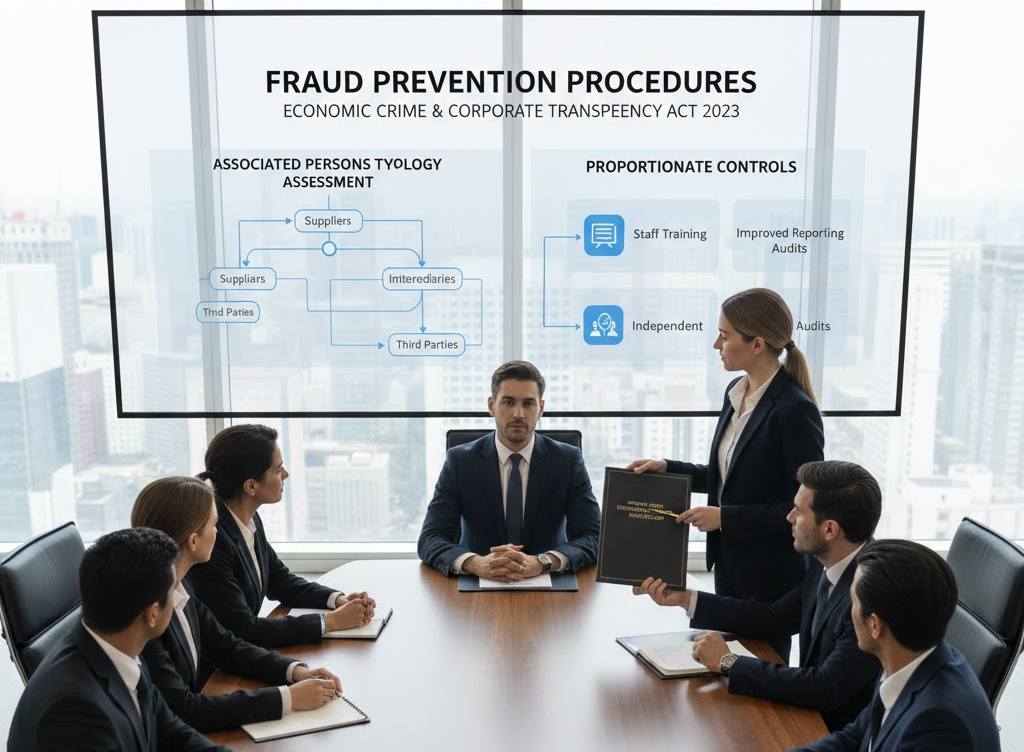Mitigating Risk and Ensuring Compliance: Legal Solutions For Modern Businesses

The new “Failure to Prevent Fraud” (FtPF) offence under the Economic Crime and Corporate Transparency Act 2023 places accountability squarely on large organisations. If an associated person commits fraud for your company’s benefit, your business could face criminal liability unless you can prove that reasonable prevention procedures were in place to prevent it.
To demonstrate compliance, you should begin with an Associated Persons Typology Assessment, which identifies individuals or third parties who might pose fraud risks. For example, reviewing supplier and intermediary relationships can reveal vulnerabilities that might otherwise go unnoticed. Once you’ve identified these risks, set out proportionate controls such as staff training, improved reporting mechanisms, and independent audits. Doing so shows regulators that your business has taken meaningful steps to prevent misconduct rather than reacting after the fact.
Strengthening Cybersecurity Amidst Evolving Threats

- Cyber threats continue to evolve faster than most businesses can adapt. The proposed Cyber Security and Resilience Bill will raise expectations for transparency and accountability, requiring organisations to share more information about breaches and vulnerabilities. Instead of relying on generic firewalls or ad hoc software updates, assess how your systems store and process sensitive data.
- Regular penetration testing, ongoing employee awareness training, and encryption upgrades all play a crucial role. These measures not only meet regulatory standards but also protect commercial relationships, allowing partners and customers to feel safer working with businesses that treat cybersecurity as a shared responsibility rather than a technical afterthought.
Adopting AI for Enhanced Risk Management
- Artificial Intelligence is becoming a powerful tool in identifying and reducing operational risks. You can use AI-driven analytics to detect anomalies in transactions, flag compliance gaps, or predict where supply chain delays might occur. The technology also supports Governance, Risk, and Compliance (GRC) processes by automating repetitive checks, freeing your team to focus on higher-value decisions.
- However, AI tools need responsible oversight. Establish clear internal policies on how data is used, reviewed, and stored. This ensures efficiency doesn’t come at the cost of ethical or legal integrity.
Navigating Supply Chain Compliance Challenges
- Global supply chains expose businesses to complex legal and ethical risks. The Corporate Sustainability Due Diligence Directive (CSDDD) requires companies to identify and address human rights and environmental issues within their supplier networks. For UK organisations trading with the EU, this means conducting detailed due diligence on sourcing, labour practices, and environmental performance.
- Engaging with experienced solicitors’ offices can provide practical legal guidance on meeting these obligations. They can help draft supplier codes of conduct, review contractual terms, and design monitoring systems that meet regulatory expectations. By working closely with legal advisers, you strengthen both compliance and commercial resilience, ensuring your business remains trusted in an increasingly transparent global market. Organizations can streamline these due diligence processes by implementing supplier management software that centralizes vendor documentation, automates compliance checks, and monitors supplier performance against ethical and regulatory standards.
Strengthening Organisational Culture Through Ethical Leadership
Legal frameworks alone cannot eliminate corporate misconduct—leadership and culture play a critical role. Building an ethical business environment starts from the top. Senior management should promote transparency, encourage reporting of unethical behaviour, and ensure employees understand that integrity is non-negotiable.
Practical steps for implementation:
- Establish a whistleblowing policy: Create anonymous channels for reporting concerns without fear of retaliation.
- Embed ethics into KPIs: Reward ethical decision-making alongside financial performance.
- Host regular workshops: Reinforce company values through scenario-based training.
When leaders model ethical behaviour, it reduces the likelihood of non-compliance across all levels of the organisation, aligning operations with both legal obligations and stakeholder expectations.
Enhancing Third-Party Oversight and Data Governance

Third-party relationships often represent the weakest link in compliance and cybersecurity frameworks. Whether you rely on vendors, distributors, or consultants, it’s vital to manage how they handle data and conduct business on your behalf.
Recommended measures:
- Third-party screening: Perform background and sanctions checks before engagement.
- Data protection clauses: Include clear terms defining responsibilities under GDPR and related privacy laws.
- Ongoing audits: Use technology-driven assessments to monitor ongoing compliance.
By tightening third-party governance, your business can reduce exposure to fraud, data breaches, and reputational harm. This also aligns with obligations under the UK Data Protection Act 2018, GDPR, and the National Cyber Security Centre (NCSC) best practice guidelines.
Final Insights
Modern businesses face rising pressure to stay compliant amid expanding legal duties, cybersecurity demands, and ethical expectations. Proactive action—through preventive controls, cultural transformation, and AI-assisted monitoring—helps reduce exposure before risks materialise.
The most resilient organisations are those that treat compliance not as a legal checkbox but as a foundation for sustainable growth and trust. Legal advisers play a crucial role here: partnering early with compliance-focused law firms or solicitors ensures your strategies remain adaptable to changing regulations.
Legal Disclaimer
This content is provided for general informational purposes only and does not constitute legal advice. Readers should seek professional legal counsel before acting on any information contained herein. Compliance requirements vary depending on business size, industry, and jurisdiction.
References
- Economic Crime and Corporate Transparency Act 2023 – UK Government
- Proposed Cyber Security and Resilience Bill – Department for Science, Innovation & Technology
- Corporate Sustainability Due Diligence Directive (CSDDD) – European Commission
- UK Data Protection Act 2018 & GDPR – Information Commissioner’s Office (ICO)
- National Cyber Security Centre (NCSC) – Best Practice Guidelines
